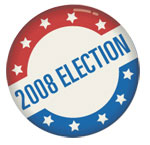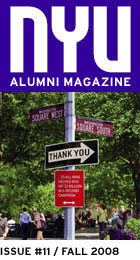economy
Read My Lips
In an election year, fiscal policies are everything but sound
by Nadine Heintz / GSAS ’00
Voters expect grand political pandering before a big election —from Louisiana populist Huey Long’s promised “chicken in every pot” to George H.W. Bush’s pledge, “Read my lips: No new taxes.” But the recent political circus prompted by the banking bailout exhibited a new and historic level of economic posturing by the presidential candidates. Even the Federal Reserve—an independent entity on paper but headed by political appointee Ben Bernanke, who could be out of a job when his term ends in 2010—is not immune. “Would [the Fed] have cut rates by 325 basis points if it wasn’t an election year?” asks Nouriel Roubini, a professor of economics and international business at the Stern School of Business who has studied how political cycles influence the economy.Last spring, the exceptionally long presidential primary season forced candidates to address economic issues with unusual detail, prompting a crop of ideas from the much derided gas tax vacation to an overhaul of the health–care system. However, Roubini says chances are slim that either John McCain or Barack Obama will succeed in pushing through radical changes, at least during their first months in office. If McCain wins, Roubini predicts that he’ll be unable to persuade the growing majority of Democrats in Congress to make the Bush tax cuts passed in 2001 and 2003 permanent. If Obama wins, he believes that Republicans will likely filibuster any major health–care reform or other sweeping proposal.
Over the past year, the stagnant housing market, spiking energy costs, and slowed spending precipitated a dramatic financial meltdown that upped the pressure on politicians to an unusual level. Even before that crisis, Congress rolled out a slew of tax rebates and corporate tax incentives to jump–start the economy. In a nonelection year, those rebates would likely have been less generous and would not have received such swift support from both parties. “Republicans are worried, but Democrats are pushing, too,” says Roubini, who is also chairman of the economic advisory firm RGE Monitor. With recession still brewing, he expects Congress to consider a second stimulus package before November.
While Roubini refuses to anoint one party over the other as the more fiscally responsible, he notes that if history is any indication, a Democrat in the White House might put an end to the recession. Indeed, almost all U.S. recessions have occurred under Republican administrations, which tend to promote policies that keep economic growth and inflation in check because their base typically consists of wealthier people. Democrats, for their part, tend to favor job growth to appeal to American workers.
No matter who moves into the White House next January, Roubini expects to see some positive developments, such as legislation providing relief to homeowners, stricter regulation of banks and mortgage lenders, and a reversal of at least some Bush tax cuts, including those that benefit the richest 1 percent of taxpayers. Just don’t expect another rebate check until 2012.

“
This fall ’s dramatic financial
meltdown upped the pressure on politicians to make promises.”







